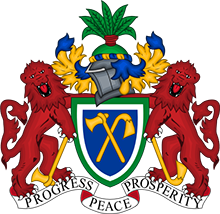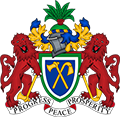The Gambia, a former British colony for over 200 years, gained its independence on the 18th of February 1965. The country became a Republic in 1970 under the leadership of Sir Dawda Kairaba Jawara who ruled until his succession by H.E Lt.Yahya A.J.J. Jammeh in 1994. Two years later, The Gambia was returned to a Democratic Government whereby the incumbent H.E. President Yahya A.J.J. Jammeh introduced a new Constitution. Under the current Constitution, general elections through secret ballots are held every five years to elect candidates who constitute the country’s National Assembly.
For administrative purposes, the country is divided into a capital (Banjul) and Seat of Government together with the adjoining Kanifing muniscipaliity and the Regions. The Regions are each headed by a Governor who is the administrative head. These regions are further subdivided into 35 Districts locally administered by Seyfolu (Chiefs). Each district covers a number of villages and settlements with the Alkalo as the village head.
Over the years, Gambia has gained an international reputation as a land of peace and tranquillity


